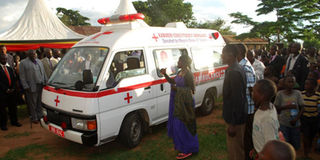Step up ambulance, emergency services

What you need to know:
- The issue: Health
- Our view: Government should increase investments for the creation of functional Emergency Medical Services to save our patients from dying from manageable emergencies as they are rushed to hospital.
Uganda has a collapsed emergency medical services and acute healthcare facilities. More distressing is that both our private emergency healthcare and private ambulance services are better equipped and stocked than those run by government.
This means government can hardly meet the needs of its citizens in distress and on the verge of death, yet are in rescuable situations.
Recent findings by Makerere University School of Public Health reveals that most of our ambulances on the road are improvised, are ill-equipped and run by ill-trained personnel, with no medicines, and poor equipment.
The report (‘Ambulances, health units poorly equipped for emergencies – study’, Daily Monitor, July 21) also cites absences of basic medical equipment such as blood pressure machines, electrocardiograms (ECG), glucometers, and defibrillators, etc.
The catastrophic result is, as one of the researchers said, are many patients dying as they are rushed to hospital or die on arrival at hospitals that are unprepared to manage emergencies.
This depressing situation is not about to be improved. In the 2020/2021 Financial Year, the government has projected to spend up to Shs45.5 trillion, but with the health sector taking a piteous Shs2.8 trillion of the National Budget.
This translates into a miserable 6.10 per cent, falling far short of the 15 per cent of annual budget, by which African Union member countries, including Uganda, pledged to scale up support to improve their health sector budget, 19 years ago in April 2001, in Abuja, Nigeria.
By 2011, UN Health agency WHO, indicated Uganda was not on track and making insufficient progress on its health sector promises, unlike our neighbour Eritrea up north east in the Horn of Africa. Remarkably, little island neighbours Mauritius and Seychelles, were both listed to be on track, while our closest neighbours Rwanda and Tanzania were also recorded as making progress.
To date, our Health sector priorities lag behind those of equally critical sectors of Works and Transport (12.85 per cent), Security (9.90 per cent), Interest Payment (9.90 per cent), and Education (7.97 per cent). There is, therefore, an urgent need to reverse the pathetic state of our ambulance and emergency services, which stands at only 30.8 per cent readiness.
This demands that government, as the report recommends, speeds up efforts to provide policies and guidelines, and increase investments for the creation of functional Emergency Medical Services to save our patients from dying from manageable emergencies as they are rushed to hospital and not die on arrival at hospitals that are unprepared to manage them.
Our commitment to you
We pledge:
- To be accurate and fair in all we do.
- To be respectful to all in our pursuit of the truth.
- To refuse to accept any compensation beyond that provided by Monitor Publications Ltd. for what we do in our news gathering and decision-making.
Further, we ask that we be informed whenever you feel that we have fallen short in our attempt to keep these commitments.




